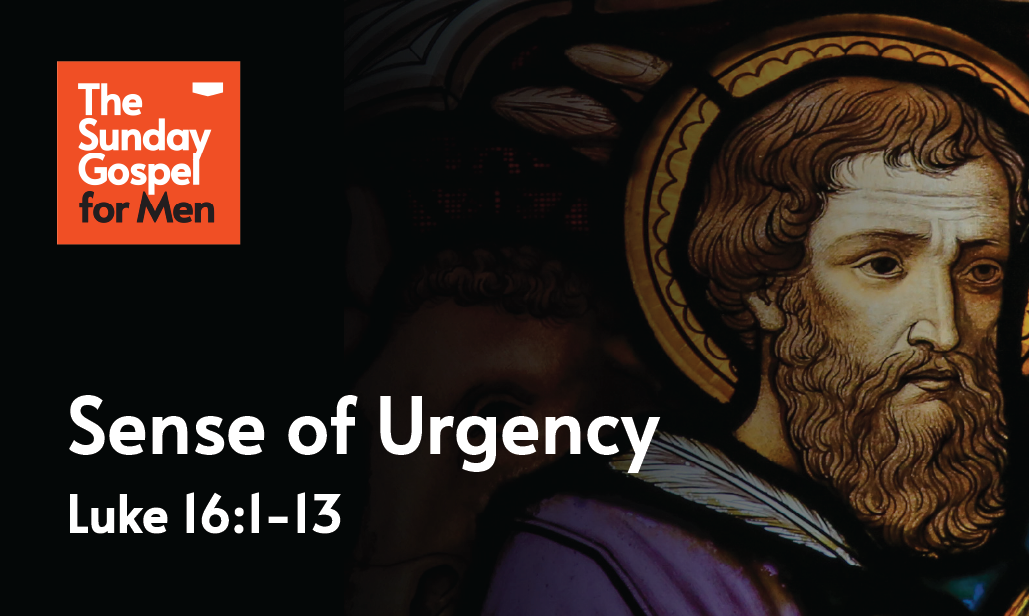For Sunday, September 18th, 2022
Reading
Jesus said to his disciples, “A rich man had a steward who was reported to him for squandering his property. He summoned him and said, ‘What is this I hear about you? Prepare a full account of your stewardship, because you can no longer be my steward.’ The steward said to himself, ‘What shall I do, now that my master is taking the position of steward away from me? I am not strong enough to dig and I am ashamed to beg. I know what I shall do so that, when I am removed from the stewardship, they may welcome me into their homes.’ He called in his master’s debtors one by one. To the first he said, ‘How much do you owe my master?’ He replied, ‘One hundred measures of olive oil.’ He said to him, ‘Here is your promissory note. Sit down and quickly write one for fifty.’ Then to another the steward said, ‘And you, how much do you owe?’ He replied, ‘One hundred kors of wheat.’ The steward said to him, ‘Here is your promissory note; write one for eighty.’ And the master commended that dishonest steward for acting prudently. “For the children of this world are more prudent in dealing with their own generation than are the children of light. I tell you, make friends for yourselves with dishonest wealth, so that when it fails, you will be welcomed into eternal dwellings. The person who is trustworthy in very small matters is also trustworthy in great ones; and the person who is dishonest in very small matters is also dishonest in great ones. If, therefore, you are not trustworthy with dishonest wealth, who will trust you with true wealth? If you are not trustworthy with what belongs to another, who will give you what is yours? No servant can serve two masters. He will either hate one and love the other, or be devoted to one and despise the other. You cannot serve both God and mammon.” Luke 16:1-13
Reflection
Right after the parable of the prodigal son, we find the parable of the dishonest or “unrighteous” steward. This parable can be difficult to understand; it almost sounds like Jesus it teaching us to be dishonest. Thankfully Jesus gives us the deeper meaning right away. The moral of the story is that we need to have a real sense of urgency to go to Heaven.
The steward is a man who was given the tremendous responsibility of taking care of his master’s wealth while the master was away. But this steward was squandering that wealth, much as the prodigal son had squandered his. The difference is that this steward never inherited the wealth, so it doesn’t belong to him. When the master discovers what has been going on, he wants to have a serious meeting concerning the steward’s accounting practices. This gets his attention.
The unrighteous steward decides to go around and collect money from his master’s debtors. Instead of one hundred measures of oil (about 800 gallons), he collects fifty. Instead of one hundred measures of wheat (about 1,000 bushels), he collects eighty. Are his actions somehow self-sacrificial, or are they just more unrighteous deeds? We know that he’s doing it for his own advantage because he says, “I know what I shall do so that, when I am removed from the stewardship, they [the debtors] may welcome me into their homes.” So what does Jesus commend him for?
In this parable, our Lord recognizes the steward’s sense of urgency to make friends with his master’s debtors. He says, “I tell you, make friends for yourselves with dishonest [unrighteous] wealth, so that when it fails, you will be welcomed into eternal dwellings.” Jesus is telling us to have the right attitude toward Heaven and money. Just like the unrighteous steward is doing whatever it takes to ensure that he has a good future on earth, we, too, should do whatever it takes to ensure that we have a good—in eternity with God.
We cannot serve two masters. Either our focus will be primarily on getting our job promotion or it will be primarily on serving God with our whole hearts. That doesn’t mean that we can’t do both, but it does mean that we need to make God our top priority at all times. Think about what would happen if more men used their time, talent, and treasure to serve God. How much better would our churches be if men had a sense of urgency to reach their final destination in Heaven? How would your life look different?
In your time of silent prayer today, reflect on your past week. Was God your top priority? Were you prudent with your time? At the end of your prayer, find one concrete way you can make attaining heaven your primary concern next week.





